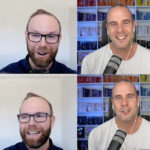Charley: James, I would call you a veteran in the podcasting space. You’re certainly someone who’s been doing it the longest. You have seen a lot. Not to mention you’ve actually coached and been around a lot of people that do podcasts, as well. And from that framing, I’d love to know, what do you see as the biggest mistakes people make with podcasting?
James: One of the mistakes I see people make is they think they’re going to recycle some other content and just broadcast as a podcast, and it won’t get any traction at all. Like they might repurpose interview calls or something and they just publish it on iTunes as a podcast. But you really need to have a podcast dedicated podcast. That’s the format taking into account the listener and the way they like to listen.
And I found, generally, sort of moderate to long-form audio content is a strong thing that people listen to. Sure, there’s videos as well. And some people just really want to watch videos. And some people watch the video, if they’re doing something else in the background. But, of course, the audio medium has been solid. So some things that don’t translate well is when you repurpose a video as an audio, and you’re missing all the context so you can’t see a slide. So that doesn’t work so well. Really, really micro-short content also can not work that well compared to a 25 to 45 minutes plus content. Then, also, sometimes really, really bad equipment can bring down a podcast to make it unbearable to listen to because a lot of people listen with headphones.
And it is a commitment when they’re putting those headphones on. That you’ve got to respect their ears and if you’re too crackly or messy or whatever, it is hard to understand. And I have published occasional podcasts with crappy sound. Though I usually explain why. It might be that I’m in a car, it might be that I am on a boat and I’ve got wind noise or it might be that I’m in an area with such miserable internet that the content supersedes the quality, but it’s rare. So try and have a minimum standard of quality. Try and have a minimum standard of show premise and purpose. Like it’s not just a rehashed or recycled thing. And that would certainly get you a good foundation.
Charley: Strong points there. And I particularly agree with the quality one. If you’re disrespectful to someone’s ears, like if it’s just really challenging to listen to someone that can drive you away. And I’ve had a recent experience that was like that, and it was a shame because it was an interview I really wanted to get. But it was like their audio was great quality and the guest like, it was unlistenable. It was too challenging to rewind and re-listen several times.
James: I had one like that where my guest was tapping something and even though I’ve tried to ask him not to. It was just the whole way. My editor tried to remove every single click. But, Charley, it took me five times to get this guy on a call. I had the crappiest line known to man. Actually, I lost the call twice during the call. I’d already spent nine hours of my own life to get better internet to get to the level of the call. And then there’s this tapping. But we still captured it. It was one of my favorite podcasts ever. My guest shared it to his own network. And we just put the little thing, you know, slightly scratchy quality. It was the best we could get. But the content overrode, you know? It’s not something I’m going to scrap because it was just too hard to create that situation of being able to record but I certainly hope to do a follow up one day and get a better copy. But that shouldn’t be the standard.
I would say the minimum standard would be a quality podcasting microphone which at the minimum just a USB one. And then beyond that, you can go crazy. And ideally, you have someone edit out anything like horrifically terrible from an audio perspective that’s going to cause people to not be able to listen.
Charley: There’s some amazing tools these days as well for editing and polishing. I mean, I’m on a fairly go-crazy rig, using your words there. You definitely can go crazy and I have. But what’s been really remarkable from my point of view and working with my editor. What he can do with someone’s audio now is phenomenal with filters and plugins and tools is that even if someone’s on, let’s say a reasonably okay connection, he can really bring them up if it’s something reasonable from there, which I’ve really enjoyed.
I want to kind of take into another direction here, James, with looking at some of the biggest mistakes. This is one that really drives me nuts is when someone kind of clickbaits me. When someone, let’s say, has a podcast title and they might say, All right, I’m going to make one up here, but it’s you know, how to double your business in 10 days, you know? Really clickbaity, it might be something I’m interested in. And then I get into the interview, and the content isn’t about that. There might be one minute of that 40 minutes in so I spend all that time hearing about their backstory.
James: Backstories, man, they drive me nuts. I’m known in my podcast for not doing backstories, and it probably angers some people, but I just get straight into it. Like just straight in, won’t even do ads. It’s how much do you respect your listener, I think. And some people abused their listener pretty heavily.
Some podcasts I listened to might be 15 minutes of ads before you get to any content. I think that’s clickbaity. And whatever the podcast title was, they should say this is an ad with a little bit of content at the end. Series number 1, 2, 3. I think that is a really valid point you’ve raised that how you format your structure is important but I think honest titles are a no-brainer. Because the same as my emails, with my social media posts, it’s fine to have curiosity but it has to be relevant to what they’re going to listen to. Because that’s a promise and if you make promises and break them, then what would you do with your paid products?
Charley: It’s setting the tone of what it’s like to work with you down the road, I feel. And I suspect if some of these shows that I won’t name the one that did this to me recently, but it’s like, I probably won’t buy from them now. Like it’s really, really rubbed me up the wrong way, have been marketing and demonstrating that. Just kind of drives me nuts there.
The other one that’s kind of a flip on this. And I must admit, I made this mistake very early on in my podcast. It was a big name guest I wanted to have on the show and I landed them. And I was like, Yes. And then I had them on the podcast and I basically let them turn my podcast into an infomercial for their brand. It was the worst interview. It was rehearsed stories from them that you could hear everywhere else. The value was super low for my audience because they could have got it elsewhere. It wasn’t relevant to them. But sadly, I see a lot of people where that’s their default. They just do infomercial show.
James: Yeah, I think that’s a guest filtering is the topic here. I’m pretty picky. Obviously, you get inundated with people wanting to be on your show when you have a show. You know, you’re on so many people’s databases from podcast bookers to individuals who recognize that your show would be a good distribution for them. And I will refuse to let someone get on my show and do big pitches. It’s not what I want for my audience so I don’t accept it. I even cut 15 minutes of pitch off a podcast I did in the last three months. We just ended the podcast without it because it was rude. And they seem to not be aware of how outrageous it was. But if I don’t like it, my audience isn’t going to like it. And I won’t have that.
And I always want to pull something out of my guests that has never been shared anywhere else. That’s one of my trademarks is to elicit something fresh or new that is valuable because otherwise, you’re right, you just blending in with the sea. If I could listen to the same person on 50 other podcasts, there’s no value created. And what’s the point of someone listening?
Charley: Yeah, I agree. And I love that you’ve come back to like, in all of the themes here, it’s like embedded in your comments, James, is a respect for your audience. It’s like you’re really putting them first with the experience. And I suspect it’s the reason why I’ve had so much success.
James: Yeah, I mean, I wouldn’t do a podcast if it was just for me. I’m not an artist. I’m not a celebrity. I’m not a DJ. I don’t have a great voice. I only do the podcast, because I get educated. And I’m able to help my audience learn stuff. And I’ve also got to know and connect with my audience. In many cases, they’ve helped me guide my health. They’ve sent me information and useful things because they’ve heard me talk about stuff. They’re really good, genuine people and I do have a connection.
Even though I have a small audience, I’ve got a great audience. And I appreciate them, having you know the commitment to spend time with me. They’re investing time, there is an expense involved in them listening to me and I have to respect that.
Need help with podcast production and optimization of content? Check out Valher Media
See our products HERE









Leave a Reply